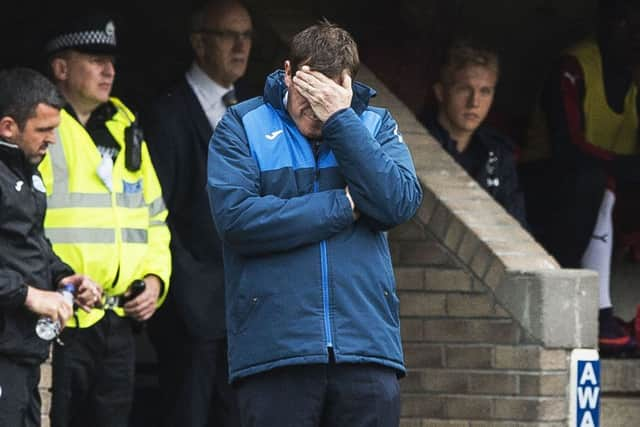Why Scottish football isn't dead, but a cure is required


“It’s been one week since you looked at me, cocked your head to the side and said I’m angry. Five days since you laughed at me...”
When Canadian band Barenaked Ladies released their hit song ‘One Week’ 19 years ago no one could have foreseen that the evocative start would be so relevant in Scottish football.


Advertisement
Hide AdAdvertisement
Hide AdWithin the past week there has been no shortage of anger, plus a great dollop of laughter. A few great dollops if truth be told. Laughter at ourselves, laughter as schadenfreude and laughter because the only other option would be to curl up into a ball and cry.
Two years ago a new theory emerged online about the Barenaked Ladies hit stating the song was about a man who had murdered his girlfriend and sat with the body for days. A little too morbid, maybe, but there have certainly been pronouncements that Scottish football has been dead for a while, only none of us have actually noticed.
Thankfully it is not dead. It’s ill, moving slowly, forgetting things, namely passing the ball coherently for 90 minutes. There are days where it’s compos mentis, only those are getting fewer and fewer.
In essence, Scottish football isn’t very good. To be more precise the actual playing of football isn’t very good. We don’t need to seek confirmation from football fans south of the border and further afield to provide us with elucidation.


It has been staring us in the face for years. Constant failure at international level and laughable defeats in European competition, resulting in a circle of calamity. The more we lose the worse our seedings and rankings become, the more we lose and so forth.
Defeats to teams from Lithuania, Malta, Luxembourg, Belarus and Gibraltar used to be unthinkable. They are not so much the norm now but certainly unsurprising when they do arrive. Why? Because teams from these countries have improved, while teams from Scotland have stagnated, if not regressed. The quality differential between Scottish sides and so-called minnows has not remained or lengthened it has shortened. And it is continuing to do so.
Then comes the reaction. Each year we get out our bingo cards ready to strike off the usual favourites. ‘I remember the days our clubs were beating Real Madird and Barcelona to go deep into European competition’. ‘SUMMER FOOTBALL’. ‘We need to stop signing foreign players and give youth a chance’.
Media commentators don’t help themselves by bringing up what happened 30 years. It only makes them appear out of touch. The footballing landscape has altered drastically and indefinitely since then. It is much harder for Scottish clubs to succeed in Europe for a variety of reasons.
Advertisement
Hide AdAdvertisement
Hide AdSummer football is a popular subject, broached at least once a season, sometimes two depending on how teams fared in Europe and the weather. Summer football is seen as some sort of utopia. Tops off, shades on, football in the sunshine - except in March when the season starts and November when the season ends - all the while our clubs steamroller through the European qualifying stages and reach the knock-out stages. The knock-out stages which begin in February. Perfect, momentous matches during pre-season preparation.
It is an all too easy solution for many without any understanding of the practicalities involved. Derek McInnes reasons there needs to be a “proper debate” and he is right. Rather than uninformed proclamations there needs to be a debate, it is far from a straightforward decision. As Craig Anderson noted two years ago: “A move to summer football would quite possibly be the biggest change Scottish football has ever undertaken, and it is therefore hugely important that all of the facts are brought to the table to allow people to make an informed decision.”
Then we come to the criticism of signing foreign players instead of promoting youth. Something which was aimed at Pedro Caixinha despite Rangers starting the game with seven Brits.
It is here we get to one of the most fundamental issues as to why Scottish football has failed to progress. The players simply aren’t good enough because the coaching isn’t good enough.
One only has to look at the recent squads for the Scotland Under-21s. There are talented players in there for sure but are there many to get excited about, ones who make you feel that a bright future is around the corner?
It says a lot about the standard of many youth players coming through at clubs if they can’t oust much of the mediocrity already on show. When Motherwell are playing Zak Jules and Hearts fielding Liam Smith, is there any surprise when teams look further afield to improve their squad?
Ziggy Gordon dared to question the quality and depth of coaching in Scotland compared to Poland and was dismissively shot down by pundits on Sportsound who had no such experience of Polish football. Which in itself presents another issue altogether, attitude.
Tommy Wright’s comments after both defeats to Lithuanian A Lyga runners-up FK Trakai certainly raised eyebrows. After the game on Thursday his request for additional players overshadowed complaints about having the “ninth or tenth (smallest) budget in the league” and the squad lacking the quality in the final third to break teams down. A defeatist mindset. The first gripe is not a legitimate complaint against the team St Johnstone were facing, the Lithuanians will have had a budget even smaller than Saints. The latter complaint says more about Wright as a coach.
Advertisement
Hide AdAdvertisement
Hide AdThis writer has written effusively about both St Johnstone and Wright’s influence, querying why he hasn’t been poached by a bigger club. But has this European tie highlighted his limitations? The limitations of a manager widely-lauded?
Wright spoke of the how Saints are hard to beat, they always have been, but struggle in the offensive side. Surely his role as coach is to improve his side in the attacking phase, make them more adaptable, he’s certainly had the time to do so.
It would be remiss not to mention Rangers at this stage. Their defeat in Luxembourg was a catastrophic tactical mismanagement.
Brendan Rodgers has his detractors, he is a quirky personality. But in terms of coaching ability he is light-years ahead in Scotland and has emphasised the impact competent coaching can have on players.
He was met by a squad who were devoid of confidence, floating along indifferently under Ronny Deila, another charlatan, one which Caixinha is in dangers of imitating. As a training ground manager, he inspired and improved, coaching them into becoming runaway winners and history makers.
When you navigate your way through the foliage, shut out all the noise and take football to its most basic level, the better the coach is the more players improve. The more players improve the more successful team will be.
Clubs do need to renege on signing so many players from abroad and the lower leagues of English football and invest the money more wisely. In youth coaching, in their academy, in scouting and analysis. But taking money away from the first-team will give the manager a convenient excuse when the team falters. When the team falters fans call for a manager to be sacked or players to be signed, which leads to a whole new issue, that of fans’ attitude and mentality.
The problem with Scottish football is endemic and to think a move to summer football would see a drastic change is sheer folly. The change needs to emerge in how clubs operate, in how they coach. They have to realise they are the problem, but they have the power within to become the solution.
If they don’t, well, we’ll always have laughter.
